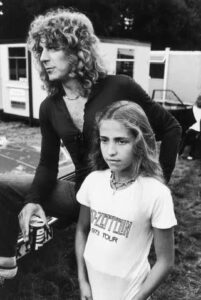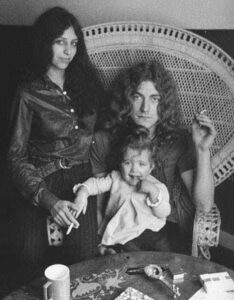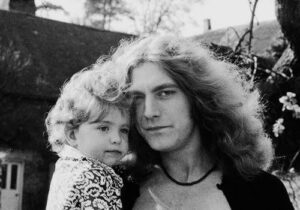Robert Plant, the magnetic lead singer of Led Zeppelin, is best remembered for his powerful vocals, iconic stage presence, and contributions to one of the most influential rock bands of all time. Yet, behind the scenes and away from the roaring crowds, Plant was a deeply devoted family man. One of the most poignant aspects of his personal life was his bond with his son Karac Pendragon Plant, born in 1972. Their relationship, filled with warmth and love, presented a stark contrast to the wild image often associated with the rock and roll lifestyle of the 1970s.

Karac’s short life left a profound and lasting impact on Plant. He was a source of joy, grounding, and inspiration for the singer during some of Led Zeppelin’s most intense years. As the band conquered stages worldwide and pushed the boundaries of rock music, Robert remained connected to home through his children. Karac, in particular, was often at the center of Plant’s attention, and the singer took great pride in his role as a father.
Tragically, Karac passed away suddenly in 1977 at the age of five from a stomach virus while Plant was away on tour in the United States. The death devastated Plant, who immediately returned home to be with his family. The pain of losing Karac was compounded by the distance and helplessness Plant felt at not being by his side during his final moments. This tragic event marked a turning point not only in Plant’s personal life but also in the dynamic of Led Zeppelin. The band, already grappling with mounting pressures and the excesses of the era, now had to contend with the deep emotional scars of its frontman.

In the aftermath of this loss, Robert Plant considered leaving the music industry altogether. The grief was immense, and he retreated from the limelight to mourn and reflect. But in time, music became a vehicle for healing. One of the most notable outcomes of this process was the song “All My Love,” featured on Led Zeppelin’s 1979 album In Through the Out Door. Unlike the band’s typical hard-edged rock sound, this song was a heartfelt, melodic tribute to Karac. Co-written by Plant and John Paul Jones, “All My Love” showcased a vulnerable and deeply personal side of Plant. The lyrics, filled with sorrow and remembrance, resonated with listeners and stood as a testament to the love a father held for his lost child.
The song remains one of the most emotionally potent tracks in Led Zeppelin’s catalog. For fans, it offers a glimpse into the softer side of Plant—a man not just driven by fame and music, but by love, loss, and fatherhood. While Plant was known for his charismatic stage presence and electrifying performances, “All My Love” revealed the emotional depths that existed beneath the surface.

Many photographs from the era, particularly those taken in black and white, capture the tenderness between Plant and Karac. These images, often candid and unposed, reflect a side of the rock legend that fans rarely saw. One particular photo, likely from the mid-70s, shows Plant cradling Karac or playing with him in a garden or backstage setting. The contrast between the leather-clad rock god and the gentle father doting on his son is both striking and beautiful. The vintage aesthetic of these photos enhances their emotional weight—each frame immortalizing fleeting, tender moments of fatherhood.
This visual and emotional duality in Plant’s life serves as a reminder that even the most iconic figures carry deeply human stories. For Robert Plant, Karac’s memory continued to influence his music and life choices long after the tragedy. He often spoke about how the loss reshaped his worldview and deepened his appreciation for life and family. In later years, Plant would go on to have more children and maintain a relatively low-profile life, choosing paths that prioritized personal fulfillment over continued superstardom.
In the legacy of Led Zeppelin, Karac Plant holds a subtle but deeply important place. Through his father’s love and grief, he became the silent muse behind one of the band’s most touching songs. And through every photograph that captures their brief time together, Karac remains an enduring symbol of the quieter, more human side of rock’s most mythical frontman.













